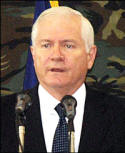|
|
Gates Backs Longer Tours for US Troops
By Jung Sung-ki
Staff Reporter
The security of South Korea is stable and safe enough to extend the length of tours by U.S. troops here and have immediate family living with them during their assignments, U.S. Secretary of Defense Robert M. Gates said Tuesday.
"I'm no expert on the exact criteria used in terms of when we have unaccompanied or accompanied tours, but generally speaking, they are unaccompanied when considered to be in a combat zone and I don't think anybody considers the Republic of Korea today a combat zone,'' Gates told a news conference after a change-of-command ceremony for the new U.S. Forces Korea commander, Gen. Walter Sharp, at the Yongsan Garrison.
Gates' remarks reflected a major shift in Pentagon policy for South Korea, which had previously been regarded as an acting war zone in the face of North Korea's nuclear and missile threats. Security experts here say Washington now believes that North Korea's threat has grown less likely because of an unwavering U.S. deterrent capability and the South Korean military's increasing strength.
Gates said he discussed the issue of putting the three-year, family-accompanied tour for U.S. soldiers here in place with Defense Minister Lee Sang-hee during a breakfast meeting earlier in the day.
Minister Lee shared the view that USFK tour "normalization'' will "positively contribute to ensuring stable service conditions and enhancing combined defense capabilities,'' a ministry spokesman said.
Lee and Gates also discussed a range of issues of mutual concern, including the planned transition of wartime operational control in 2012, the realignment of U.S. troops, and international peacekeeping operations among others, he said.
Gen. Walter L. Sharp, the new commander of U.S. troops in South Korea, also echoed the need for the three-year tours by American forces.
"Our goal is to rapidly reach the point when all U.S. service members can bring their families to Korea and stay here for a normal three-year tour,'' he said at the ceremony.
Currently, most U.S. troops here are required to serve a one-year tour without their families. A USFK official said only 10 percent of the 27,000 troops here are with their families now.
In comparison, about 75 percent of U.S. soldiers stationed in Europe and Japan are accompanied by their families, said the official.
Former USFK Commander Gen. B. B. Bell reiterated the tour extension would help U.S. forces continue to meet their security responsibilities with South Koreans, without sending a message of reduced commitment or weakness to potential adversaries, including North Korea.
Critics say, however, the potential family-accompanied program, along with the pause in removing 3,500 U.S. troops by the year's end, may require South Korean taxpayers to pay for additional construction of base facilities, such as schools and hospitals.
"I told Minister Lee I was in support of this but because it would require additional facilities we would need to look at it as a long term plan,'' Gates said.
The United States has asked South Korea to pay more for the presence of American troops and their families. Seoul pays some 43 percent of costs related to the USFK presence, but the United States wants Seoul to contribute more to reach the 50-50 level.
The defense secretary dismissed speculation that U.S. troops in South Korea could be deployed to other parts of the world where America faces conflicts, such as Iraq and Afghanistan, under the "strategic flexibility'' plan.
"I reaffirmed the discussions and commitments made at Camp David in terms of the U.S. troop level,'' he said. "We will keep our commitments made at Camp David and we will ensure we will maintain at least the same capabilities we have here or perhaps be able to enhance them.''
President Lee Myung-bak and U.S. President George W. Bush agreed in April to halt the drawdown of troops on the peninsula at 28,500 to help further strengthen the half-century-long alliance between the two nations.
Public jitters have recently grown following media reports that the U.S. could send a battalion of Apache attack helicopters in South Korea to Afghanistan.
"As I indicated earlier, as we go forward we will not take any action without full consultations with our Korean ally,'' Gates said, adding no decision has been made regarding the Apache deployment.
Korea Times (Posted 6/3/08)
